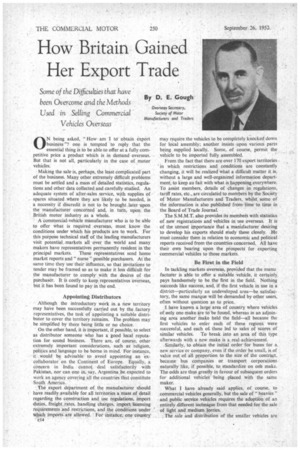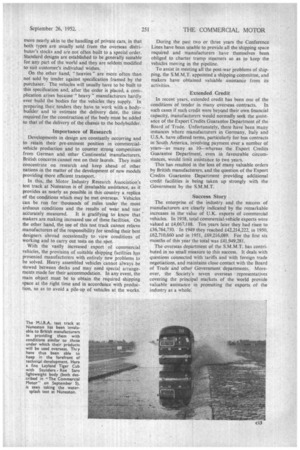How Britain Gained Her Export Trade
Page 80

Page 81

If you've noticed an error in this article please click here to report it so we can fix it.
Some of the Difficulties that have been Overcome and the Methods Used in Selling Commercial Vehicles Overseas By D. E. Gough ON being asked, "Howam I to obtainexport business "? one is tempted to reply that the essential thing is to be able to offer at a fully competitive price a product which is in demand overseas. But that is not all, particularly in the case of motor vehicles.
Making the sale is, perhaps, the least complicated part of the business. Many other extremely difficult problems must be settled and a mass of detailed statistics, regulations and other data collected and carefully studied. An adequate system of after-sales service, with supplies of spares situated where they are likely to be needed, is a necessity• if discredit is not to be brought later upon the manufacturer concerned and, in turn, upon the British motor industry as a whole.
A commercial-vehicle manufacturer who is to be able to offer what is required overseas, must know the conditions under which his products are to work. For this purpose technical staff of the leading manufacturers visit potential markets all over the world and many makers have representatives permanently resident in the principal markets. These representatives send home market reports and " nurse" possible purchasers. At the same time they use their influence, so that invitations to tender may be framed so as to make it less diffioult for the manufacturer to comply with the desires of the purchaser. It is costly to keep representatives overseas, but it has been found to pay in the end.
Appointing Distributors
Although the introductory work in a new territory may have been successfully carried out by the factory representatives, the task of appointing a suitable distributor to cover the territory remains. The problem may be simplified by there being little or no choice.
On the other hand, it is important, if possible, to select as distributor someone who has a good local reputation for sound business. There are, of course, other extremely important considerations, such as religion, politics and language to be borne in mind. For instance, it would be advisable to avoid appointing an .excollaborator on the Continent of Europe. Equally, a concern in India cannot deal satisfactorily with Pakistan, nor can one in, say, Argentina be expected to work an agency covering all the countries that constitute South America.
The export department of the manufacturer should have readily available for all territories a mass of detail regarding the construction and use regulations, import duties, freight, rates, handling charges, import licensing requirements and restrictions, and the conditions under which imports. are allowed. For instance, one country -c14 • "
may require the vehicles to be completely knocked down for local assembly; another insists upon various parts being supplied locally. Some, of course, permit the vehicle to be imported fully assembled.
From the fact that there are over 170 export territories ' in which restrictions and conditions are constantly changing, it will be realized what a difficult matter it is, without a large and well-organized information department, to keep au fait with what is happening everywhere. To assist members, details of changes in regulations, tariff rates, etc., are circulated to members by the Society of -Motor Manufacturers and Traders, whilst. some of the information is also published from time to time in the Board of Trade Journal.
The S.M.M.T. also provides its members with statistics of new registrations and vehicles in use overseas. It is of the utmost importance that a manitfacturer desiring to develop his exports should study these closely. He must consider them in relation to economic and political reports received from the countries concerned. All have their own bearing upon the prospects for exporting commercial vehicles to those markets.
Be First in the Field
In tackling markets overseas, provided that the marwfacturer is able to offer a suitable vehicle, it certainly pays handsomely to be the first in the field. Nothing succeeds like success, and, if the first vehicle in use in a district—particularly an undeveloped area—be satisfactory, the same marque will be demanded by other users, often without question as to price.
I have known a large area of country where vehicles of only one make are to be found, whereas in an adjoining area another make held the field—all because the first vehicles to enter each of these regions were successful, and each of these led to sales' of scores of similar vehicles. To break into an area of this type afterwards with a new. make is a real achievement.
Similarly, to obtain the initial order for buses for a_ new service or company, even if the order be small, is of value out of all proportion to the size of the contract, because bus companies or transport corporations naturally like, if possible, to standardize on ode make. The odds are thus greatly in favour of subsequent orders for additional vehicles being placed with the same maker.
• What I have already said applies, of course, to commercial vehicles generally, but the sale of" heavies" and public setvice.vehicies requires the adoption of an entirely different technique from that needed for the sale of light and medium lorries.
The ,sale and distribution of the smaller vehicles are more nearly akin to the handling of private cars, in that both types are usually sold from the overseas distributor's stocks and are not often built to a special order. Standard designs are established to be generally suitable for any part of the world and they are seldom modified to suit customer's individual wishes.
On the other hand, " heavies" are more often than not sold by tender against specification framed by the purchaser. The vehicles will usually have to be built to this specification and, after the order is placed, a complication arises because " heavy " manufacturers hardly ever build the bodies for the vehicles they supply. In preparing their_ tenders they have to Work with a bodybuilder and to estimate the delivery date, the time required for the construction of the body must be added to that of the delivery of the Chassis to the bodybuilder.
Importance of Research Developments in design are constantly occurring and to retain their pre-eminent position in commercialvehicle production and to counter strong competition from German and other Continental manufacturers, British concerns cannot rest on their laurels. They must concentrate on research and keep ahead of other nations in the matter of the development of new models providing more efficient transport.
In this, the Motor Industry Research Association's test track at Nuneaton is of invaluable assistance, as it provides as nearly as possible in this country a replica of the conditions which may be met overseas. Vehicles can be run for thousands of miles under the most arduous conditions and the results of wear and tear
accurately measured. It is gratifying to know that makers are making increased use of these facilities. On the other hand, the use of this test track cannot relieve manufacturers of the responsibility for sending their best designers abroad occasionally to view conditions of working and to carry out tests on the spot.
With the vastly increased export of commercial vehicles, the provision of suitable shipping facilities has . presented manufacturers with entirely new problems to be solved. Heavy assembled vehicles cannot always be stowed between decks and may need special arrangements made for their accommodation. In any event, the main object must be to obtain the required shipping space at the right time and in accordance with production, so as to avoid a pile-up of vehicles at the works.
During the past two or three years the Conference Lines have been unable to provide all the shipping space required and manufacturers have themselves been obliged to charter tramp steamers so as to keep the vehicles moving in the pipeline.
To assist in meeting all the post-war problems of shipping, the S.M.M.T, appointed a shipping committee, and makers have obtained valuable assistance from its activities.
Extended Credit In recent years, extended credit has been one of the conditions of tender in many overseas. contracts. In such cases if such credit were beyond their own financial capacity, manufacturers would normally seek the assistance of the Export Credits Guarantee Department of the Board of Trade. Unfortunately, there have been many instances where manufacturers in Germany, Italy and U.S.A. have offered terms, particularly for bus contracts in South America, involving payment over a number of years—as many as 10—whereas the Export Credits Guarantee Department, even in favourable circumstances, would limit assistance to two years.
This has resulted in the loss of many valuable orders by British manufacturers, and the question of the Export Credits Guarantee Department providing additional credit facilities is being taken up strongly with the Government by the S.M.M.T.
Success Story The enterprise of the industry and the success of manufacturers are clearly indicated by the remarkable increases in the value of U.K. exports of commercial vehicles. In 1938, total commercial-vehicle exports were valued at £4,067,188. Ten years later they had risen to £36,764,730. In 1949 they reached £42,214,222, in 1950, £62,710,660 and in 1951, £69,216,089. For the first six months of this year the total was £41,949,281.
The overseas department of the S.M.M.T. has contributed in no small measure to this success. It deals with questions connected with tariffs and with foreign trade negotiations, and maintains close contact with the Board of Trade and other Government departments. Moreover, the Society's seven overseas representatives covering the principal markets of the world provide valuable assistance in promoting the exports of the industry as a whole.




































































































































































































































































































